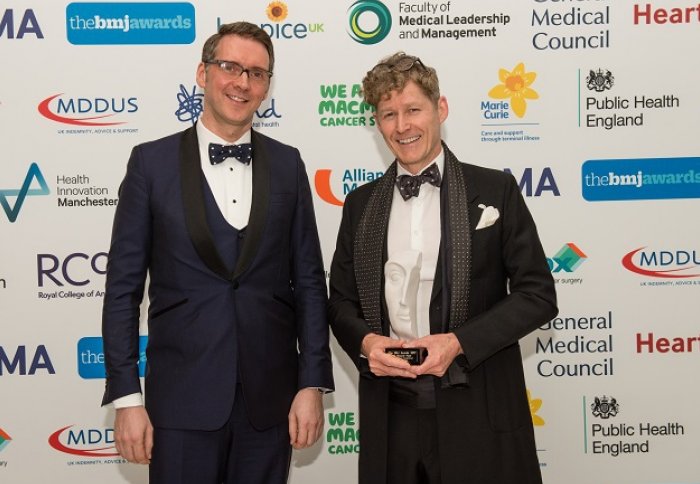NHLI team win BMJ UK research paper of year award for asthma trial
by Ellyw Evans

Professor Martin Cowie presents Professor Sebastian Johnston with the award.
A team of researchers led by the NHLI's Professor Sebastian Johnston received the BMJ UK Research Paper of the Year Award on 4 May.
This prestigious award, which recognises original UK research that has the potential to contribute significantly to improving health, was awarded for the AZALEA trial (AZithromycin Against pLacebo in Exacerbations of Asthma).
Current treatment guidelines advise doctors not to routinely prescribe antibiotics in acute asthma attacks. The AZALEA randomised clinical trial was designed to determine whether azithromycin – an antibiotic used for the treatment of a number of bacterial infections – offered any clinical benefits when added to standard care for asthma attacks.
I was very proud to accept the award on behalf of the AZALEA team of about 100 doctors and nurses who worked so hard to recruit to this trial.
– Professor Sebastian Johnston
Study Lead
Sebastian Johnston, Professor of Respiratory Medicine and Allergy at the NHLI, has previously made significant findings in this therapy area. In 2006 his TELICAST study showed that a different antibiotic, telithromycin, does improve outcomes when added to standard care, but with the risk of liver toxicity. These findings prompted a deeper investigation by Johnston and NHLI colleagues, leading to the two and a half year long AZALEA study with a total of 31 centres enrolled across the UK.
The team’s paper, published in JAMA Internal Medicine, concluded that the study showed no statistical or clinically significant benefit to adding azithromycin to standard care, contrasting with the positive findings of the TELICAST study. “It didn’t show any benefit. The upshot is that the guidelines will continue to recommend that it not be used, as the evidence it works is insufficient.” said Professor Johnston.
A remarkable finding of this study was the difficulty experienced by the team in recruiting eligible patients. “We screened more than 4500 patients, of whom only 199 were randomised.” More than 2000 patients were excluded because they were already receiving antibiotics for their asthma attack - despite the guidelines recommending against routine antibiotic use. This important finding sheds light on the ongoing issue of widespread antibiotic use, as well as uncovering the worrying implications of ineffective antibiotic stewardship programs.
Johnston adds that “the study cannot be considered a conclusively negative study, as the patients randomised were very likely unrepresentative of the whole population of patients experiencing asthma attacks.” He stated that “a further study of azithromycin in a setting of low antibiotic usage is still needed to see if this treatment has clinical benefit.”
Johnston said he was very proud to accept the award on behalf of the AZALEA team of about 100 doctors and nurses, from 31 sites around the country, who worked so hard to recruit to this trial.
Judges for this year’s BMJ Awards included over 40 senior representatives from the healthcare sector as well as two representatives from the BMJ. On announcing the winning UK Research Paper of the Year, the judges commented that they “were particularly impressed that the AZALEA Trial addressed an issue in a very common condition in which use of antibiotics is widespread and by this making is quite difficult to study.” The Award was sponsored by the National Institute for Health and Care Excellence.
Now in its ninth year, The BMJ Awards are the UK’s premier medical awards programme, recognising and celebrating the inspirational work done by doctors and their teams. Imperial College Healthcare NHS Trust also celebrated on the evening after winning Surgical Team of the Year for helping patients make healthy lifestyle changes ahead of surgery. This team also took home the Patient Partnership Award.
Article supporters
Article text (excluding photos or graphics) © Imperial College London.
Photos and graphics subject to third party copyright used with permission or © Imperial College London.
Reporter
Ellyw Evans
Faculty of Medicine Centre